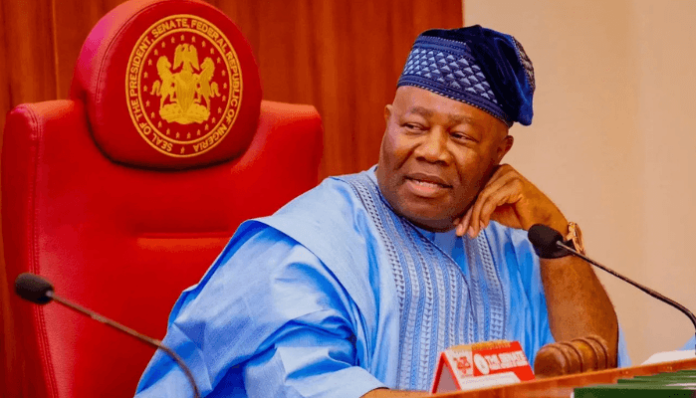Senate President Godswill Akpabio has threatened to sue Joy Nunieh, the former acting Managing Director of the Niger Delta Development Commission (NDDC), over her recent allegations of sexual harassment. Akpabio made this statement on Friday during an event marking International Women’s Day at the National Assembly complex in Abuja.
Nunieh had previously accused Akpabio of attempting to assault her when she served as the head of the NDDC. She made these claims public in 2020, saying she slapped Akpabio in self-defense after he allegedly tried to sexually assault her. According to Nunieh, she was the only woman who had ever slapped Akpabio, calling the incident a reaction to his “Plan B” after she refused to take money from him.
However, Akpabio has vehemently denied these claims. He called Nunieh’s allegations baseless and dismissed them as an attempt to discredit him. Akpabio further alleged that Nunieh had made the accusations to cover up a more serious issue—her lack of a valid National Youth Service Corps (NYSC) certificate, which he claimed led to her removal from her position as NDDC MD.
In his remarks on Friday, Akpabio revealed that the late Abba Kyari, the former Chief of Staff to President Muhammadu Buhari, had flagged concerns about Nunieh’s credentials, specifically questioning the authenticity of her NYSC certificate. According to Akpabio, Kyari sent him a letter informing him that the NYSC had confirmed that Nunieh had not completed her national service. This revelation, Akpabio explained, prompted him to take action and replace her as NDDC MD to avoid potential embarrassment.
Akpabio further claimed that once Nunieh was removed from office, she began spreading allegations about him, including the accusation of sexual harassment. He described how the situation escalated, with Nunieh claiming that he had asked her to swear an oath of allegiance in the Villa, the Presidential residence, a claim he dismissed as false. Akpabio then pointed to a television interview in which Nunieh referred to the incident as a form of sexual harassment, though she later clarified it was not rape.
These new allegations come amid other claims of sexual harassment against Akpabio, including a recent accusation from Senator Natasha Akpoti-Uduaghan. Akpoti-Uduaghan, who represents Kogi Central in the National Assembly, has also accused Akpabio of harassment, which has raised questions about his conduct and prompted discussions on the treatment of women in Nigerian politics.
Akpabio’s comments on Friday, delivered in front of an audience during a celebration for International Women’s Day, were aimed at defending his reputation and challenging the accusations against him. He declared that he would be taking legal action against Nunieh, stating that she would be hearing from his lawyer in the coming days.
In his words, “My other sister, the one they sometimes refer to as Joy Nunieh, I would like to mention her name because she will be hearing from my lawyer anytime in the next week. Crime never dies.”
Akpabio’s legal threat has stirred up a fresh debate on the issue of sexual harassment in Nigeria, particularly in the political arena, where women continue to face significant challenges. While the specifics of the case remain unclear, this latest development highlights the complex relationship between politics, power, and gender dynamics in the country.
The allegations against Akpabio are particularly significant given his prominent position as Senate President and his history with the NDDC. As the head of the Niger Delta Ministry, Akpabio was responsible for overseeing the NDDC, an agency tasked with the development of the Niger Delta region, one of Nigeria’s most oil-rich but neglected areas. His tenure has been marked by controversy, with accusations of mismanagement and corruption often trailing him.
The ongoing disputes involving Akpabio and Nunieh also reflect broader concerns over the management of the NDDC, which has faced criticism for its handling of funds meant for regional development. In 2020, a public feud between Akpabio and Nunieh made headlines after Nunieh was removed from office under controversial circumstances. She had accused Akpabio of attempting to interfere in the agency’s operations for personal gain, a claim that fueled further tensions between them.
These developments also highlight the power struggles that characterize Nigerian politics, where individuals in positions of authority often face serious allegations of misconduct, but very few are held accountable. The frequent accusations of sexual harassment, whether proven or not, continue to be a critical issue for Nigerian women in politics. Many women have come forward with stories of harassment but have often been met with little support or action from authorities.
The situation also calls attention to the lack of a strong legal framework for protecting women in the workplace and in public life in Nigeria. While there are laws in place to prevent sexual harassment, many women who face such abuse, especially in high-profile positions, often find themselves isolated and unsupported. As in Akpabio’s case, accusations often become part of a larger political battle, obscuring the real issue of gender-based violence.
As Akpabio prepares to take legal action against Nunieh, the case is likely to remain in the spotlight for the foreseeable future. The ongoing feud between the two figures also promises to keep attention focused on the NDDC and its leadership, as well as on the broader issue of gender equality in Nigerian politics.
For now, both Akpabio and Nunieh are left to contend with the fallout from their allegations, while the public watches closely to see how the legal process unfolds. In a country where political and personal disputes often intersect, it remains to be seen whether any meaningful resolution will be reached, or if the accusations will continue to fuel public debate.

